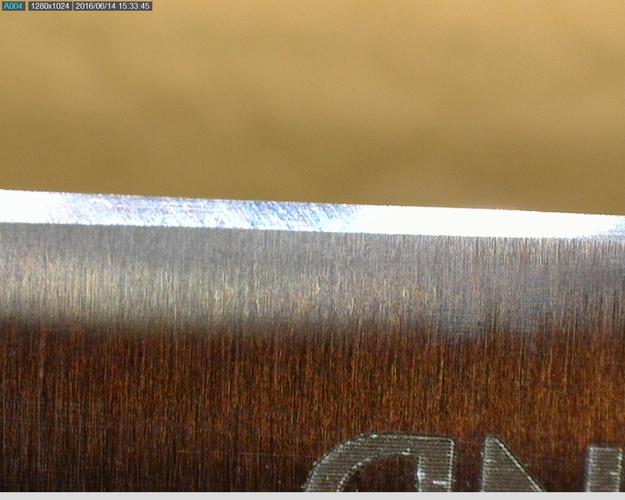Results 1 to 10 of 63
-
02-21-2018, 08:11 AM #1
 Natural hone for setting the bevel?
Natural hone for setting the bevel?
Hello gents,
I am seeking for a natural hone to serve as a bevel setter.
BBW, Thuringian, JNat, Coticule, Vermio, Cretan? Which one for bevel setting?
Thanks in advance
Elias
-
02-21-2018, 08:28 AM #2Senior Member


- Join Date
- Apr 2008
- Location
- Saint Paul, Minnesota, United States
- Posts
- 2,944
Thanked: 433
A soft Arkansas might do it
-
The Following User Says Thank You to rodb For This Useful Post:
captainhx (02-21-2018)
-
02-21-2018, 08:38 AM #3

Fast coarse BBW's & Coticules can be had cheaply. JNats are slow compared to synthetics. The other 2, I have no experience with.
The white gleam of swords, not the black ink of books, clears doubts and uncertainties and bleak outlooks.
-
The Following 2 Users Say Thank You to onimaru55 For This Useful Post:
captainhx (02-21-2018), TheCoticuleWhisperer (06-26-2018)
-
02-21-2018, 10:22 AM #4

Wastilla from Finland, Pyrenees sandstone, a couple of Italian sandstones, there is a nice Spanish, Pedra das Meigas that works as well, Wallachian sandstone but it's hard to find, a quartzite stone that with slurry works nicely from the area Peter/hatzicho is from, a few from UK but they are really hard to find today... a couple of years ago I could remember some 20 different stones, now I'm a bit rusty.
I would not mention the Arkansas stones however, they are slow even for sharpening bronze.
Talking about slow, this is the reason we prefer the man made ones; the particles are a lot harder than the ones in natural stones, and thus cut steel a whole lot faster.
On naturals, it's pretty much silicon oxide, or some variation but with similar hardness, Mohs~7. On man made, it's AlOx or SiC Mohs 9 to 9++. It makes a huge difference, and the harder the steel, the bigger said difference on steel removal. Razors are made to be as hard as possible for steel, so, the natural stones for them is not the right way to go.
For finishers, it makes sense since the feeling of a natural stone can't be seen from pretty much any synthetic stone. On the lower spectrum of grit though, it's quite the opposite.
-
-
02-21-2018, 11:48 AM #5

I have been using a Cretan hone for years now (occasional use), and it works well enough for me. If I'd be doing a lot of honing, I might have looked into something else.
I tried a Wästilä (living in Finland and all), but I wouldn't advise it for use on nice razors, as it is a bit scratchy. It works well enough for beaters and workhorse knives, though.
-
The Following User Says Thank You to Pithor For This Useful Post:
captainhx (02-21-2018)
-
02-21-2018, 12:08 PM #6

I'll be the heathen and say I often use a BBW .... dry, if that doesn't cut fast enough I take out a very fast Coticule on slurry.
I use a BBW dry for a lot of things, but I've messed around with trouble blades I couldn't just get sharp or arm hair shaving and took them to a dry BBW for giggles, turned out it did a great job getting it sharp
although I haven't tried 'em on blades that were FAR off, the razors I used were within reasonable reach but definitely not shaving any arm hairs
I'll have to do a chip correction on the BBW to see how fast / slow it goes
I just do regular half strokes on either side of the blade
(I also use a Coticule dry for that purpose sometimes, but on slurry it's definitely much faster)Last edited by TristanLudlow; 02-21-2018 at 12:16 PM.
-
The Following User Says Thank You to TristanLudlow For This Useful Post:
captainhx (02-21-2018)
-
02-21-2018, 12:08 PM #7
-
02-21-2018, 12:28 PM #8

Natural finishers are still around because the edge is friendlier to our skin; the round shaped particles that finish our edges are different than most of the AlOx and SiC ones from the man made ones.
As for hardness, for the real razors, the softest start from 58RC and go up to 67 and even higher on some Iwasaki. You wouldn't call that soft, otherwise they would be made out of the "dreaded" 18/8 steel our spoons are made out of, and without the tempering. No hard feelings on that 18/8 steel, the spoons or the manufacturers, everything serves a purpose after all. But razors are different.
Edit; you don't need diamond hardness to refine an already well shaped edge, just to remove a few micrometers and refine the edge a bit further. On bevel setting on the other hand, you might even need to remove a whole millimeter. You can't exactly do that with a translucent Arkansas, or at least it will take enough time and elbow sweat, it will be a nightmare.Last edited by Vasilis; 02-21-2018 at 12:31 PM.
-
02-21-2018, 12:45 PM #9Senior Member

- Join Date
- Sep 2013
- Location
- NW Indiana
- Posts
- 1,060
Thanked: 246
I would like to see a reference (preferably with test methodology) regarding steel being hardened over 67 Rc. I have never heard of steel getting harder than about 66 Rc. Steel this hard would likely be nearly useless and very chippy.
-
02-21-2018, 12:56 PM #10

Carbon steel straight razors can be scratched pretty easy. They do not seem that hard to me. Also I wouldn't attempt to take a millimeter of steel off with the Translucent . Soft arkansas would me my choice.


 50Likes
50Likes LinkBack URL
LinkBack URL About LinkBacks
About LinkBacks






 Reply With Quote
Reply With Quote


